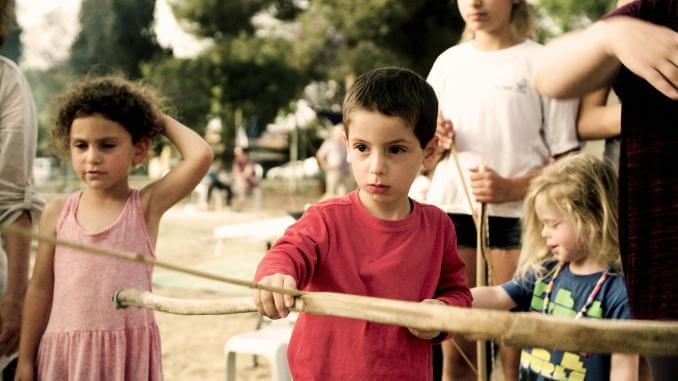Tragic Israeli Doc Innocence Makes Convincing Plea Against Conscription

Few countries can understand the kind of military indoctrination underway in Israel like the United States. Depending on what half of the country you come from, it’s more than likely you have a relative who followed the trajectory from gun hobbyist to spiteful fetishist in the last 20 years. It’s not unlikely that you have a Facebook friend more upset that Kyle Rittenhouse is being sued than by the 582 mass shootings this year that have killed 604 people in the U.S. So when an American sees footage of an Israeli elementary schooler holding an M-16, the horrible truth is that it’s not as shocking as it should be. But documentarian Guy Davidi’s Innocence only starts there, providing a harrowing multimedia case against his country’s conscription and the pressure squeezing the Israeli children staring down its barrel.
Refusal to serve in the Israel Defense Forces has been around as long as Israel, predominantly publicized by open letters or graffiti from active service members, or in loose organizations of high schoolers. The main issue isn’t just that they must be trained to kill in order to stay in their country—what one subject of Innocence calls a “compromise”—but that they’re being put to use as an enforcing instrument to what the Human Rights Watch is finally calling apartheid against Palestinians. Davidi, who left his IDF service after three months, already made a movie about this a decade ago: 5 Broken Cameras, co-helmed by Palestinian filmmaker Emad Burnat. Here, his focus is back on Israel, with the implied question being “If you can’t care about Palestinians, how about your own children?”
Davidi underlines the history that’s led up to this deadly, tragic modern era by giving a voice to students and soldiers alike, but especially to those who didn’t survive the transition from one to the other. Innocence uses the words, letters, poetry, artwork and home video footage of soldiers who took their own lives during the course of their training to craft a crushing portrait of social railroading where victims feel like they have no way out. This revelation—that we’re hearing dead ex-soldiers—rolls towards you slowly and unavoidably. You might not realize it the first time Innocence tells you. You might subconsciously tune it out. This narration, from those like Halil Givati Rapp, isn’t just compelling audio, but a respectful reconstruction of life. They are tracked back from the brink to the beginning, shrunk down from front line soldiers back to frustrated kids tired of camcordered questions from mom and dad. What’s so startling is how omnipresent their fate in the military is no matter when on Davidi’s shifting timeline we catch them. There are varying levels of acceptance and coping across the subjects, but a consistent resignation to the status quo. It’s so intimate, so personal and raw, that it’d feel exploitative—voyeuristic—if the content of the letters weren’t so bluntly clear: Conscription did this.
For parents, “this” is a dead child. For Israel, it’s bad PR. Davidi shows the complicity throughout: Without active resistance from authority figures, children are overwhelmed by the military’s greedy hands. We see children weeping as they squeeze off their first rounds of ammunition; we see children climbing on tanks, getting their faces painted by soldiers at a perverse military Field Day; we see children that know if you touch a certain fence, you’ll alert the armed guards. But as much as some kids go along with it all, either unquestioning or blithely patriotic under the watch of their teachers and parents, others stand out. Lonely and unassimilated.
-

-

-

-

-

-

-

-

-

-

-

-

-

-

-

-

-

-

-

-

-

-

-

-

-

-

-

-

-

-

-

-

-

-

-

-

-

-

-

-








































